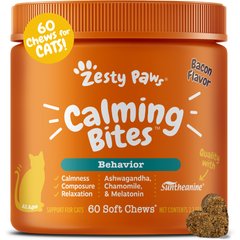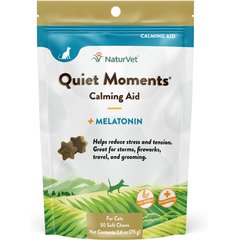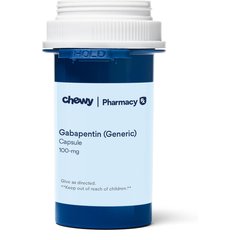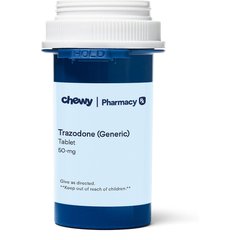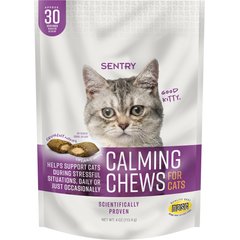Melatonin for Cats: Can Cats Take Melatonin?

Photo by Chewy
Many people take melatonin for sleep or jet lag, but can cats have melatonin too?
Melatonin isn’t typically a go-to treatment in veterinary medicine, but you’ll often find it in calming supplements for cats. It may help reduce stress or encourage rest, especially when paired with other soothing ingredients.
Here’s a closer look at melatonin for cats, including how it works, when it may be recommended, and the best way to give it safely.
Always speak to your veterinarian before giving your cat supplements.
Key Takeaways
- Melatonin is a natural hormone that may help cats feel calmer and sleep better, especially during short-term stress.
- While not a go-to treatment, veterinarians may recommend melatonin alongside other therapies for sleep issues, anxiety, or certain medical conditions.
- Most cats tolerate melatonin well, but it can cause mild side effects like daytime drowsiness or upset stomach.
- Always talk to your vet before giving your cat melatonin or supplements that contain it.
What Is Melatonin for Cats?
Melatonin is a hormone humans and other mammals, including cats, produce naturally. It’s made in the pineal gland in the brain in response to darkness and is suppressed by light. This helps set the cat’s internal clock for sleep and wake cycles.
As a supplement, cat melatonin is a lab-made version of this same hormone. It’s available over the counter, but you should always get your veterinarian’s approval before giving it to your cat.
Recommended Products
Benefits of Melatonin for Cats
While melatonin is not commonly used in cats, it does have its place for certain issues, says Daniel Dixon, DVM, founder of North Keller Animal Hospital in Keller, Texas.
Some of the possible benefits of feline melatonin include:
- Reducing short-term anxiety: Dr. Dixon says it may be helpful for cats dealing with short-term anxiety due to changes in routine, travel, separation anxiety, or occasional noise sensitivities.
- Supporting better nighttime sleep: Melatonin may help cats who are restless at night due to pain or anxiety.
- Supporting certain medical conditions: Melatonin may be helpful for managing certain health issues, such as alopecia, adrenal disorders, or certain immune-related diseases.
Dr. Dixon notes that, in most cases, melatonin is used alongside other treatments rather than on its own.
Side Effects of Melatonin for Cats
“Fortunately, significant risks are not expected with melatonin, and it’s relatively safe in cats,” says Renee Schmid, DVM, DABT, DABVT, director of veterinary medicine and senior veterinary toxicologist at the Pet Poison Helpline, a 24/7 animal poison control hotline.
While side effects can occur, Dr. Schmid says most are mild, though higher doses may cause stronger reactions.
Melatonin side effects in cats are usually mild and may include drowsiness, daytime sluggishness, or vomiting if too much is given.
Dr. Schmid also notes that cats with respiratory or neurologic disease, or those taking other medications, may not be good candidates for melatonin. Always check with your vet before giving melatonin—or any melatonin-containing supplement—to your cat.
Does My Cat Need Melatonin?
Most cats don’t need melatonin as part of their everyday routine. However, in certain situations, your vet may recommend it, usually as part of a holistic treatment plan.
Melatonin may be suggested if your cat:
- Is dealing with a source of short-term stress, such as moving or a change in routine
- Is having trouble sleeping at night due to pain or anxiety
- Is dealing with certain medical conditions, like alopecia or adrenal-related issues
Do Veterinarians Recommend Melatonin for Cats?
While not a first-line treatment, veterinarians may recommend melatonin in some cases. It’s generally safe, but research on its effectiveness is limited.
Melatonin also tends to be less reliable than other medications more commonly prescribed for sleep or anxiety in cats, such as benzodiazepines, Benadryl, gabapentin, or trazodone.
Recommended Products
What Is the Best Melatonin for Cats?
Melatonin is often found in over-the-counter supplements designed to help cats manage stress and anxiety. While it’s not a prescription drug, you should still check with your vet before giving them any new product.
Here are some highly rated supplements that contain melatonin, which may help your cat feel more at ease:
- Sentry Calming Chews: Crunchy chews with melatonin, thiamine, L-tryptophan, theanine, and chamomile. Pet parents say cats love the taste.
Recommended Product
- VetClassics Stress Away Soft Chews: Soft chews with melatonin, chamomile, passionflower, and ginger to support calm and ease digestive upset.
Recommended Product
- Zesty Paws Calming Bites: Bacon-flavored bites with melatonin, L-theanine, valerian root, and chamomile.
Recommended Product
- NaturVet Quiet Moments Soft Chews: Unflavored chews with melatonin, chamomile, and ginger to help ease stress and support relaxation.
Recommended Product
FAQs About Melatonin for Cats
Is melatonin safe for cats?
Yes, melatonin is generally considered safe for cats when used correctly and under a veterinarian’s guidance.
Is melatonin bad for cats?
Not usually. Most cats tolerate it well, though it may cause sleepiness or stomach upset in some. Cats with certain health conditions or on medication should avoid melatonin unless approved by a vet.
How much melatonin can I give my cat?
There’s no standard dose. Your vet will determine the right amount based on your cat’s size, health, and needs. If it’s in a supplement, follow the label instructions.
How do I sedate my cat at night?
It’s not recommended to sedate cats just because they’re active at night. If your cat is restless, consult your vet to rule out health issues and explore safe calming options.
Are there over-the-counter sedatives for cats?
No. Melatonin and other supplements may help your cat relax, but they aren’t true sedatives. Sedation should only be done with medication prescribed by a veterinarian.
